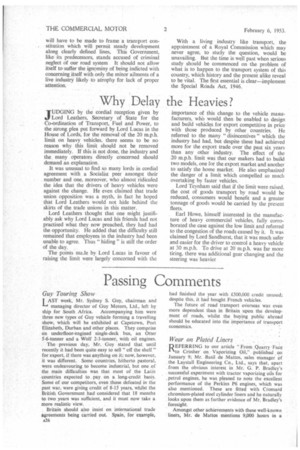Why Delay the Heavies?
Page 28

If you've noticed an error in this article please click here to report it so we can fix it.
JUDGING by the cordial reception given by Lord Leathers, Secretary of State for the Co-ordination of Transport. Fuel and Power, to the strong plea put forward by Lord Lucas in the House of Lords, for the removal of the 20 m.p.h. limit on heavy vehicles, there seems to be no reason why this limit should not be removed immediately. If this is not done, the industry and the many operators directly concerned should demand an explanation.
It was unusual to find so many lords in cordial agreement with a Socialist peer amongst their number and one, moreover, who almost ridiculed the idea that the drivers of heavy vehicles were against the change. He even claimed that trade union opposition was a myth, in fact he hoped that Lord Leathers would not hide behind the skirts of the trade unions in this matter.
Lord Leathers thought that one might justifiably ask why Lord Lucas and his friends had not practised what they now preached, they had had the opportunity. He added that the difficulty still remained that employees in the industry had been unable to agree. Thus " hiding " is still the order of the day.
The points maie by Lord Lucas in favour of raising the limit were largely concerned with the importance of this change to the vehicle manufacturers, whb would then be enabled to design and build vehicles for export competitive in price with those produced by other countries. He referred to the many " disincentives " which the industry had had, but despite these had achieved more for the export trade over the past six years than any other industry. The effect of the 20 m.p.k limit was that our makers had to build two models, one for the export market and another to satisfy the home market. He also emphasized the danger of a limit which compelled so much overtaking by faster vehicles.
Lord Teynham said that if the limit were raised, the cost of goods transport by road would be reduced, consumers would benefit and a greater tonnage of goods would be carried by the present fleets.
Earl Howe, himself interested in the manufacture of heavy commercial vehicles, fully corroborated the case against the low limit and referred to the congestion of the roads caused by it. It was claimed by Lord Sandhurst., that it was much safer and easier for the driver to control a heavy vehicle at 30 m.p.h. To drive at 20 m.p.h. was far more tiring, there was additional gear changing and the steering was heavier




























































































